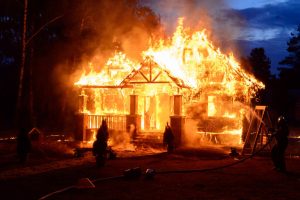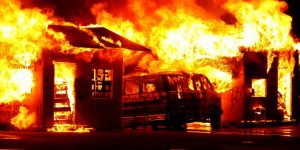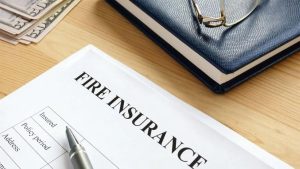Introduction to Fire Insurance
Fire insurance is an essential safety net for homeowners and businesses alike. It provides financial protection against damages caused by accidental fires, ensuring that property owners don’t face crippling expenses when disaster strikes. A fire can lead to significant loss of assets, both material and sentimental, as well as disrupt daily life or business operations. By paying a small premium, fire insurance policyholders can safeguard their property and recover without financial strain. This article explores the key aspects of fire insurance, breaks down what it covers, and offers advice on finding the best plan to suit your needs.
Understanding Fire Insurance Coverage
Fire insurance policies typically cover damages and losses stemming from accidental fires. These can include not just accidental blazes but also damages caused by smoke, explosion, or natural disasters such as lightning strikes. Comprehensive fire insurance may extend to furnishings, machinery, and valuable possessions within the insured property. Additionally, certain policies go beyond the physical damages, compensating for the loss of income during the period in which a business cannot operate due to fire. However, it’s crucial to understand the exclusions, as damages caused by negligence, war, or intentional fires are generally not covered.
Factors Affecting Fire Insurance Rates
When it comes to the cost of fire insurance, several factors can influence the premium rates. The geographic location of the property is a significant factor—it could be higher for properties in fire-prone areas or urban centers. Construction materials also matter; properties made of fire-resistant materials may result in lower premiums. Other factors, such as the age of the building, its use, and proximity to a fire department, also come into play. Insurers may also account for additional safety features like sprinkler systems, fire alarms, and extinguishers in assessing the cost of coverage. A detailed risk assessment helps insurers determine premiums, and understanding these factors can help policyholders budget accordingly.
Comparing Fire Insurance Plans
Not all fire insurance plans are created equal. When comparing plans, it’s important to evaluate the extent of coverage offered versus the premium being charged. Some plans provide basic fire damage protection, while others offer more comprehensive coverage, including additional perils like explosions, riots, or natural disasters. Comparing deductibles is equally crucial since a higher deductible could mean lower monthly premiums but larger out-of-pocket expenses during a claim. Customer reviews and the reputation of the insurer are great indicators of the reliability of a policy. Online comparison tools and consultations with insurance professionals can help you identify plans that best suit your needs without overstepping your budget.
Choosing the Right Fire Insurance Plan
Finding the right fire insurance plan requires a mix of research and self-assessment. First, ascertain the value of your property and possessions to determine the amount of coverage you need. Then, consider your risk factors—are you located in a wildfire-prone area or near an industrial zone? Next, prioritize plans that offer comprehensive protection, even if they have slightly higher premiums. Don’t forget to inspect policy clauses detailing inclusions, exclusions, and renewal terms. You should also verify the claim settlement ratio of the insurer, as this reflects their efficiency in settling claims promptly and fairly. Personalized advice from an insurance broker can be invaluable in parsing through fine print and providing you with tailored recommendations.
Filing a Fire Insurance Claim
Filing a fire insurance claim might seem daunting, but understanding the process makes it far easier. The first step is to inform your insurer as soon as the damage occurs. Most insurance companies require notification within a specific time frame. Next, document the damage thoroughly with photographs or videos, and compile a list of damaged or lost items. A fire report from the local authorities may also be required to verify the cause of the fire and validate the claim. Upon submitting the required documents, insurers will assess the extent of the loss through a surveyor. After verification, the claim amount is paid according to the policy terms. Timely and accurate documentation can streamline this process significantly.
Tips to Prevent Fires and Minimize Damage
While fire insurance provides financial protection, prevention is always better than cure. Simple measures such as installing smoke detectors, fire alarms, and sprinkler systems can drastically reduce the risk of fire. Regularly inspect wiring, electrical appliances, and gas connections for any faults that may ignite fires. Educating employees or family members on fire safety protocols and evacuation plans is equally important. Keep fire extinguishers readily accessible and ensure everyone knows how to use them. For businesses, having a periodic fire safety audit can pinpoint vulnerabilities and prevent potential disasters. By following these precautions, you increase not only your safety but also your ability to secure favorable terms from insurers.
Protect Your Property and Future with Fire Insurance
Fire insurance is more than just a policy—it’s peace of mind. Knowing that your property, business, or belongings are protected against fire damage allows you to focus on what matters most without constantly worrying about the unknown. Every property owner faces unique risks, so there’s no one-size-fits-all solution. However, by understanding policies, comparing plans, and following safety precautions, you can make a well-informed decision that aligns with your needs and budget. Investing just a little time now can save you considerable stress in the future, leaving you equipped to tackle emergencies head-on.
Frequently Asked Questions
What does fire insurance cover?
Fire insurance typically covers damages caused by accidental fires, smoke, lightning, natural disasters, and explosions. Some plans also compensate for indirect losses like business interruption.
Are there exclusions in fire insurance policies?
Yes, most policies exclude damages caused by intentional fires, negligence, and events like wars or nuclear risks. Always read the policy documents to understand the exclusions.
How can I lower the cost of fire insurance?
Installing fire safety equipment like alarms, sprinklers, and extinguishers can lower insurance premiums. Additionally, choosing higher deductibles may reduce your monthly payments.
How do I file a fire insurance claim?
Notify your insurer immediately, document the damage, and submit written evidence. Provide all required documentation, including a fire report and inventory of damages, to ensure a smooth claims process.
Which fire insurance plan is best for me?
The best plan depends on your property value, risk factors, and coverage needs. Compare policies side by side and consult experts to find a plan that balances affordability with comprehensive coverage.




